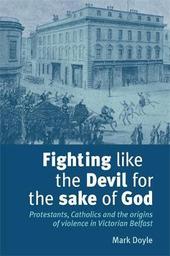
|
Fighting Like the Devil for the Sake of God: Protestants, Catholics and the Origins of Violence in Victorian Belfast
Hardback
Main Details
| Title |
Fighting Like the Devil for the Sake of God: Protestants, Catholics and the Origins of Violence in Victorian Belfast
|
| Authors and Contributors |
By (author) Mark Doyle
|
| Physical Properties |
| Format:Hardback | | Pages:320 | | Dimensions(mm): Height 234,Width 156 |
|
| Category/Genre | British and Irish History |
|---|
| ISBN/Barcode |
9780719079528
|
| Classifications | Dewey:941.67081 |
|---|
| Audience | | Postgraduate, Research & Scholarly | |
|---|
| Illustrations |
Maps|Illustrations, black & white
|
|
Publishing Details |
| Publisher |
Manchester University Press
|
| Imprint |
Manchester University Press
|
| Publication Date |
1 April 2009 |
| Publication Country |
United Kingdom
|
Description
This fascinating book about Belfast in the middle of the nineteenth century looks at how and why Ireland's most prosperous and industrialized town began to tear itself apart. This study provides a vivid example of how a society can come apart at the seams - and how it can stay that way for generations. Through a series of steadily escalating riots, working-class Protestants and Catholics forged a tradition of violence that profoundly shaped their own identities and that of the city itself, setting the stage for the bitter conflicts of the next century. Fighting like the Devil for the Sake of God describes that foundational moment, offering a new analysis of Belfast's violence that is rooted in the social lives of those who constructed this bitter rivalry and those who were forced to endure it. This book will be of interest to scholars in the fields of Irish and Modern History. -- .
Author Biography
Mark Doyle is Copeland Fellow at Amherst College, Massachusetts.
Reviews'This is a significant and original study that should have a profound influence on how historians understand the evolution and meanings of violence in Ulster. The book is engagingly written, deftly integrates a broad range of historical and cultural sources and provides a new historical, and no doubt controversial, narrative and analysis that is bound to engage the attentions of historians, cultural analysts and students for quite some time to come.' Professor Maria Luddy, University of Warwick
|